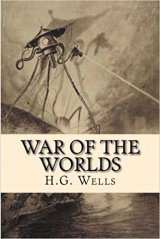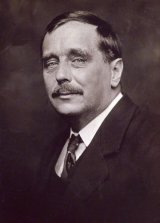The War of the Worlds Page #14
The War of the Worlds is a science fiction novel by English author H. G. Wells first serialised in 1897 by Pearson's Magazine in the UK and by Cosmopolitan magazine in the US.
Since then he had been skulking along towards Maybury, in the hope of getting out of danger Londonward. People were hiding in trenches and cellars, and many of the survivors had made off towards Woking village and Send. He had been consumed with thirst until he found one of the water mains near the railway arch smashed, and the water bubbling out like a spring upon the road. That was the story I got from him, bit by bit. He grew calmer telling me and trying to make me see the things he had seen. He had eaten no food since midday, he told me early in his narrative, and I found some mutton and bread in the pantry and brought it into the room. We lit no lamp for fear of attracting the Martians, and ever and again our hands would touch upon bread or meat. As he talked, things about us came darkly out of the darkness, and the trampled bushes and broken rose trees outside the window grew distinct. It would seem that a number of men or animals had rushed across the lawn. I began to see his face, blackened and haggard, as no doubt mine was also. When we had finished eating we went softly upstairs to my study, and I looked again out of the open window. In one night the valley had become a valley of ashes. The fires had dwindled now. Where flames had been there were now streamers of smoke; but the countless ruins of shattered and gutted houses and blasted and blackened trees that the night had hidden stood out now gaunt and terrible in the pitiless light of dawn. Yet here and there some object had had the luck to escape--a white railway signal here, the end of a greenhouse there, white and fresh amid the wreckage. Never before in the history of warfare had destruction been so indiscriminate and so universal. And shining with the growing light of the east, three of the metallic giants stood about the pit, their cowls rotating as though they were surveying the desolation they had made. It seemed to me that the pit had been enlarged, and ever and again puffs of vivid green vapour streamed up and out of it towards the brightening dawn--streamed up, whirled, broke, and vanished. Beyond were the pillars of fire about Chobham. They became pillars of bloodshot smoke at the first touch of day. CHAPTER TWELVE WHAT I SAW OF THE DESTRUCTION OF WEYBRIDGE AND SHEPPERTON As the dawn grew brighter we withdrew from the window from which we had watched the Martians, and went very quietly downstairs. The artilleryman agreed with me that the house was no place to stay in. He proposed, he said, to make his way Londonward, and thence rejoin his battery--No. 12, of the Horse Artillery. My plan was to return at once to Leatherhead; and so greatly had the strength of the Martians impressed me that I had determined to take my wife to Newhaven, and go with her out of the country forthwith. For I already perceived clearly that the country about London must inevitably be the scene of a disastrous struggle before such creatures as these could be destroyed. Between us and Leatherhead, however, lay the third cylinder, with its guarding giants. Had I been alone, I think I should have taken my chance and struck across country. But the artilleryman dissuaded me: "It's no kindness to the right sort of wife," he said, "to make her a widow"; and in the end I agreed to go with him, under cover of the woods, northward as far as Street Cobham before I parted with him. Thence I would make a big detour by Epsom to reach Leatherhead. I should have started at once, but my companion had been in active service and he knew better than that. He made me ransack the house for a flask, which he filled with whiskey; and we lined every available pocket with packets of biscuits and slices of meat. Then we crept out of the house, and ran as quickly as we could down the ill-made road by which I had come overnight. The houses seemed deserted. In the road lay a group of three charred bodies close together, struck dead by the Heat-Ray; and here and there were things that people had dropped--a clock, a slipper, a silver spoon, and the like poor valuables. At the corner turning up towards the post office a little cart, filled with boxes and furniture, and horseless, heeled over on a broken wheel. A cash box had been hastily smashed open and thrown under the debris. Except the lodge at the Orphanage, which was still on fire, none of the houses had suffered very greatly here. The Heat-Ray had shaved the chimney tops and passed. Yet, save ourselves, there did not seem to be a living soul on Maybury Hill. The majority of the inhabitants had escaped, I suppose, by way of the Old Woking road--the road I had taken when I drove to Leatherhead--or they had hidden. We went down the lane, by the body of the man in black, sodden now from the overnight hail, and broke into the woods at the foot of the hill. We pushed through these towards the railway without meeting a soul. The woods across the line were but the scarred and blackened ruins of woods; for the most part the trees had fallen, but a certain proportion still stood, dismal grey stems, with dark brown foliage instead of green. On our side the fire had done no more than scorch the nearer trees; it had failed to secure its footing. In one place the woodmen had been at work on Saturday; trees, felled and freshly trimmed, lay in a clearing, with heaps of sawdust by the sawing-machine and its engine. Hard by was a temporary hut, deserted. There was not a breath of wind this morning, and everything was strangely still. Even the birds were hushed, and as we hurried along I and the artilleryman talked in whispers and looked now and again over our shoulders. Once or twice we stopped to listen. After a time we drew near the road, and as we did so we heard the clatter of hoofs and saw through the tree stems three cavalry soldiers riding slowly towards Woking. We hailed them, and they halted while we hurried towards them. It was a lieutenant and a couple of privates of the 8th Hussars, with a stand like a theodolite, which the artilleryman told me was a heliograph. "You are the first men I've seen coming this way this morning," said the lieutenant. "What's brewing?" His voice and face were eager. The men behind him stared curiously. The artilleryman jumped down the bank into the road and saluted. "Gun destroyed last night, sir. Have been hiding. Trying to rejoin battery, sir. You'll come in sight of the Martians, I expect, about half a mile along this road." "What the dickens are they like?" asked the lieutenant. "Giants in armour, sir. Hundred feet high. Three legs and a body like 'luminium, with a mighty great head in a hood, sir." "Get out!" said the lieutenant. "What confounded nonsense!" "You'll see, sir. They carry a kind of box, sir, that shoots fire and strikes you dead." "What d'ye mean--a gun?" "No, sir," and the artilleryman began a vivid account of the Heat-Ray. Halfway through, the lieutenant interrupted him and looked up at me. I was still standing on the bank by the side of the road.
Translation
Translate and read this book in other languages:
Select another language:
- - Select -
- 简体中文 (Chinese - Simplified)
- 繁體中文 (Chinese - Traditional)
- Español (Spanish)
- Esperanto (Esperanto)
- 日本語 (Japanese)
- Português (Portuguese)
- Deutsch (German)
- العربية (Arabic)
- Français (French)
- Русский (Russian)
- ಕನ್ನಡ (Kannada)
- 한국어 (Korean)
- עברית (Hebrew)
- Gaeilge (Irish)
- Українська (Ukrainian)
- اردو (Urdu)
- Magyar (Hungarian)
- मानक हिन्दी (Hindi)
- Indonesia (Indonesian)
- Italiano (Italian)
- தமிழ் (Tamil)
- Türkçe (Turkish)
- తెలుగు (Telugu)
- ภาษาไทย (Thai)
- Tiếng Việt (Vietnamese)
- Čeština (Czech)
- Polski (Polish)
- Bahasa Indonesia (Indonesian)
- Românește (Romanian)
- Nederlands (Dutch)
- Ελληνικά (Greek)
- Latinum (Latin)
- Svenska (Swedish)
- Dansk (Danish)
- Suomi (Finnish)
- فارسی (Persian)
- ייִדיש (Yiddish)
- հայերեն (Armenian)
- Norsk (Norwegian)
- English (English)
Citation
Use the citation below to add this book to your bibliography:
Style:MLAChicagoAPA
"The War of the Worlds Books." Literature.com. STANDS4 LLC, 2025. Web. 10 Jan. 2025. <https://www.literature.com/book/the_war_of_the_worlds_43>.




Discuss this The War of the Worlds book with the community:
Report Comment
We're doing our best to make sure our content is useful, accurate and safe.
If by any chance you spot an inappropriate comment while navigating through our website please use this form to let us know, and we'll take care of it shortly.
Attachment
You need to be logged in to favorite.
Log In